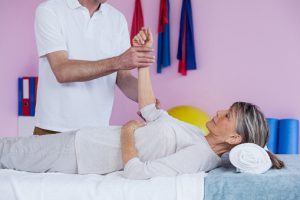
Tingling in the left arm: Common causes and prevention tips
Tingling in the left arm can be triggered by many different causes—some more serious than others. It’s important to pay attention to other symptoms you may be experiencing while the tingling in the left arm is taking place in order to identify the exact cause.
Generally speaking, tingling in any extremity is quite common. Many people refer to it as “the limb has fallen asleep.” When a limb falls asleep, you may feel tingling or numbness. This often occurs as a result of pressure on the nerves or arteries, which may limit blood supply to the area.
In some cases, tingling of a limb can signal a serious condition, especially if it is chronic. Continue reading…
Chronic neck pain can be relieved with tai chi, a low-impact mind-body exercise, according to research findings. Researchers compared a group of participants who completed tai chi exercises for neck pain relief to a control group that did not receive treatment. The study also examined whether tai chi is more beneficial than traditional neck exercises.
The study enrolled 114 participants who suffered from neck pain for at least three months. Coauthor Peter M. Wayne explained, “The study results showed that 12 weeks of tai chi was more effective than no treatment to improve pain, disability, quality of life, and postural control in persons with chronic neck pain.”
Tai chi focuses on specific movements tied with breathing techniques, aiming to improve mobility, flexibility, and reduce pain. Continue reading…
It might be something you don’t want to think about or are too embarrassed to discuss with a doctor, but floating poop (or steatorrhea, as it is referred to medically) could be a sign of a real health issue.
Stools are usually solid, yet there are cases where a change in fecal structure makes your stools float or stick to the toilet. Floating poop is normally pal, soft, foul-smelling, and sticky. In many cases, people can have a floating stool due to dietary changes, but in other situations it could indicate a health problem that should be addressed. Although it may sound disgusting, people do need to pay attention to their poop. Continue reading…
If you’ve ever slept the wrong way through the night, then you may have woken up with a crick in your neck. A crick in your neck makes it difficult to move your head in certain directions, or even to use the arm that is on the affected side.
Aside from sleeping wrong, certain activities can also increase the risk of developing a crick in the neck. When combined with stress, muscles can become tense, making the crick in your neck much more severe and debilitating.
Generally, a crick in the neck will resolve on its own and often doesn’t require medical attention. You can also use home remedies to improve your recovery. Continue reading…
Recovery after heart surgery improves with psychological support, according to a recent study published in BMC Medicine. Professor Winifred Rief of the University of Marburg, Germany, conducted the study utilizing the placebo effect. He offered different levels of psychological support to three different groups, all undergoing cardiac surgery.
Patients were all addressed pre-surgery—one group was given high expectations about recovery, another given psychological support but no expectations for recovery, and the third given the standard medical care. Those in the first group had the quickest recovery, as they scored lower on disability tests and reported being more active and mentally healthy six months after their surgeries. Continue reading…